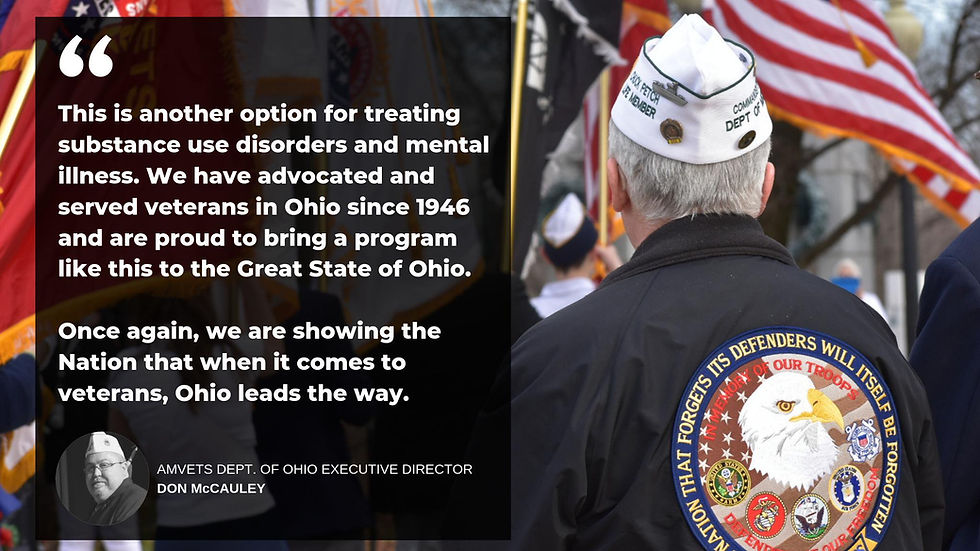AMVETS, ODVS and OMHAS to launch pilot program to make Transcranial Magnetic Stimulation available f
- AMVETS Department of Ohio
- Jun 12, 2019
- 4 min read

American Veterans (AMVETS) Department of Ohio, the Department of Veterans Services (ODVS), and the Ohio Mental Health & Addiction Services (OMHAS), are launching a pilot program to make Transcranial Magnetic Stimulation (TMS) available for veterans with substance use disorders (SUD) and mental illness.
The three-year pilot program will be funded by a collaboration between both the state of Ohio and industry leaders in the private sectors medical technology. This alliance will be coordinated by the Veteran’s Medical Initiative (VMI), a program of the Seattle Space Exploration and Medical Initiative (SSEMI), The Ohio State University, and Pinnacle Treatment Centers (Ohio). VMI will continue to explore adding collaborative partners in a multitude of disciplines in order to get a project of this magnitude accomplished.
“Our nation’s freedom has rested on those who borne the battle — a costly price for many, and for some, the debt is too much to bear,” said Senator Frank Hoagland (R-Mingo Junction), retired Navy SEAL. “Working together with my Senate colleagues, AMVETS, ODVS and OMHAS, I am pleased to secure funding in the Senate’s version of the state budget in support of this new method of treatment to effectively help veterans recover from PTSD and other related conditions. This is a way for us to help bind up the wounds, save lives, find peace and discover a better life for those who’ve lost their way, defending you and me.”
Don McCauley, Executive Director of AMVETS Department of Ohio, said his organization “is honored to lead the state’s TMS Pilot Program in bringing this alternative treatment to Ohio’s veterans.”
“This is another option for treating substance use disorders and mental illness. We have advocated and served veterans in Ohio since 1946 and are proud to bring a program like this to the Great State of Ohio. Once again, we are showing the Nation that when it comes to veterans, Ohio leads the way,” he added.
TMS treatments were approved by the US Food and Drug Administration to treat depression in 2008. According to the Veterans Affairs (VA), numerous commissioned studies have resulted in positive effects using TMS treatments with effects having shown to last well after the treatments have been completed.
"I started medical school 57 years ago and since then I’ve seen a lot of advances in medicine. I believe TMS has the potential to be a significant addition to our therapeutic modalities for improving the lives of patients with addiction problems and certain mental health disorders" said retired Former Surgeon General of the United States Navy, Vice Admiral Harold Koenig, MD. Potential side effects are generally minor and include headache, tingling, and lightheadedness immediately after treatment.
Historically TMS has been used to treat depression, but there is growing evidence that it has the potential to help veterans manage PTSD and TBI symptoms. SSEMI Medical Director Dr. Sandra Vermeulen has overseen the use of TMS treatments to target specific areas of the brain using brief magnetic pulses to generate a weak electrical current in the brain which activates neuronal circuits, promoting neuronal synchronization and optimal brain function.
"I believe noninvasive TMS has the potential to help treat many cognitive disorders. I am excited to collaborate with the State of Ohio to find ways to help our veterans manage their symptoms,” Vermeulen said.
The two Ohio organizations who will be tasked to integrate the TMS treatments into established treatment programs are looking forward to the innovative technology.
“I am very excited to collaborate with industry leaders and organizations to deliver transformative neuro technology in conjunction with multi-disciplinary treatments to improve chronic pain symptoms and the lives of veterans” said Dr. Marcie Bockbrader, Assistant Professor & Director of Neuromodulation and Human- Machine Interface Programs for the Department of Physical Medicine and Rehabilitation at The Ohio State University Wexner Medical Center. (See slideshow from Dr. Marcie Bockbrader presented at AMVETS Ohio Annual Convention).
Joe Pritchard, a Navy Veteran and the CEO of Pinnacle Treatment Centers a recognized leader in comprehensive substance use treatments stated “We are honored to be included in the statewide initiative to develop and provide state of the art treatment services to our veterans. We are committed to being a true partner, as we create healthier pathways for the men and woman who have risked their lives to protect our freedoms.”
For the greater part of the past decade the state of Ohio has desperately worked to find solutions to help manage the crisis of substance use and mental illness contributing factors to suicidalities. It has not been for lack of effort or resources, more so the issue has been the “siloed” approach to research and healthcare that has allowed “gaps” for individuals to fall through.
As discussed earlier, in order to get a project of this magnitude accomplished, you need to start by building a solid collaborative foundation of subject matter experts.
With the Ohio Legislature, ODVS, OMHAS, and AMVETS working together with industry leaders in the private sectors medical technology, we can identify those gaps and develop treatment plans to address the individual needs of the Veteran. The veteran community has long borne the greatest personal cost in defense of our nation’s freedom and it is only fitting that when it comes to Veterans health, Ohio leads the way.
We are asking all veterans in Ohio to reach out to their House of Representatives to support the Senate’s budget plan to bring this much needed program to the veterans of Ohio.
.png)

























